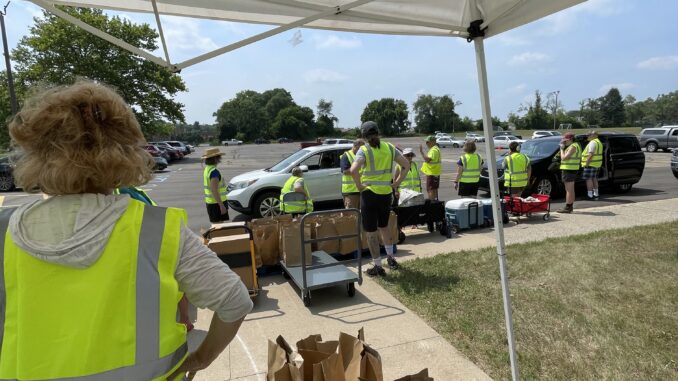
The Community Table of Albion, a program by the Albion Healthcare Alliance that provides food to Albion residents who need it, is facing budget cuts as a result of larger cuts on the federal level to the U.S. Department of Agriculture (USDA).
Due to lack of funding, the USDA paused $500 million to the Emergency Food Assistance Program (TEFAP), resulting in a 50% decrease to TEFAP’s budget.
How These Cuts Impact the Community Table
Monique Hernandez, program and administrative assistant for the Albion Healthcare Alliance, said federal cuts have trickled down to the local level.
To supply the Community Table of Albion, the chain of distribution starts at the federal level with the USDA. This department allocates to large regional food banks, such as Feeding America, which has numerous locations in every state. The next level would be more local, such as the South Michigan Food Bank in Battle Creek, Hernandez said. Finally, the food reaches the most local level, where the Community Table resides.
“We were notified by one of our food providers, Community Action, that instead of being able to provide us with enough food for 300 clients a month, or 300 families, they now will only be able to provide 200 (families) because of those funding cuts that happened in March,” Hernandez said.
The team behind the Community Table have been concerned about these funding cuts since March when they were announced, Hernandez said. It wasn’t until August that Hernandez said she received the news, confirming their fears.
On top of having to relocate to Marshall Opportunity High School, volunteers worried about their fellow community members, Hernandez said.
To deal with this new challenge, changes had to be made to the way the Community Table operates.
“We paused our pantry so that we could just focus on drive through because it serves more clients,” Hernandez said. “That would give us more time to move our food and really settle into the space and organize.”
This change has allowed the Community Table to pull together the resources needed to support the extra 100 families no longer supported by Community Action. While the Community Table’s stock is dwindling, Hernandez said that they would be receiving over 10,000 pounds of food next week from South Michigan Food Bank to address higher demand.
Impact on Albion Residents
According to the Michigan State Medical Society, Medicaid faces a $3.7 billion reduction, Public Health sees a $92.5 million dollar reduction and Human Services will be down $1 billion.
Professor of women’s, gender and sexuality studies Trisha Franzen said she has been following the funding cuts as closely as she can.
As a frequent volunteer at the Community Table, she was interested in figuring out how drastically these changes will impact Albion residents. However, there are some details that she has not been able to fully discover due to the lack of transparency in the process of state budgeting.
Franzen added that even before the funding cuts, Albion residents have struggled with food insecurity.
“We have four census blocks in Albion, and the one in the northwest part of the city has one of the highest levels of food insecurity in the county,” Franzen said.
As demand for food has increased, so have prices, and many Albion residents cannot keep up with the inflated costs, Franzen said. Even before they make it to the store, transportation is the larger issue. Albion does not have any large chain grocery stores, which makes it harder to access the kind of food that residents need.
“We have seen our attendance numbers skyrocket, and recently broke our record for number of families served at our drive-through food distribution,” Hernandez said.
Cutting programs like Supplemental Nutrition Assistance Program (SNAP) and Medicaid make it more difficult for those who require them to compete with rising grocery prices, Hernandez said. Because of this, pantries like the Community Table become even more vital.
“It feels like we’re just providing a basic need and people really are grateful, they’re always saying thank you in the line. They say thank you to every single volunteer they see,” Hernandez said.
Franzen said seeing the positive effects of the Community Table on Albion residents was “eye opening.” Amid all the uncertainty, she said she realized that people will still take the time to show their gratitude.
“A couple years ago, one of the people in the community started taking what was left at our bin at the community garden down to Peabody Place,” Franzen said. “We got a note signed by a whole lot of the people there thanking us for it because they said it was the only fresh produce they got, period, all year.”

Leave a Reply